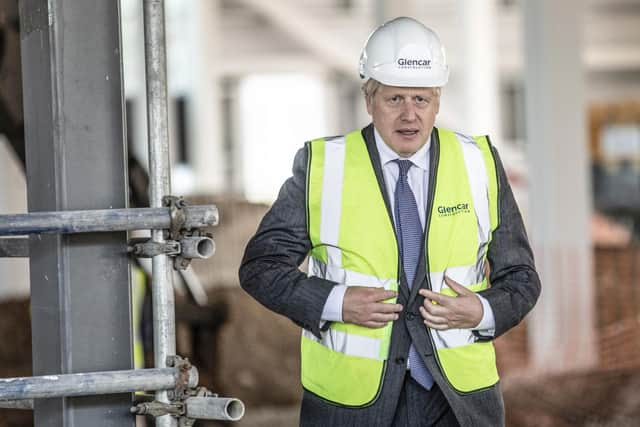Johnson urged to act ‘sooner rather than later’ to curb Covid surge
and live on Freeview channel 276
Professor Neil Ferguson – whose modelling led the Government to order the lockdown in March – said the UK is facing a “perfect storm” following the easing of controls over the summer.
His warning came as Boris Johnson spends the weekend in Downing Street considering new restrictions across England as the latest figures show new infections are doubling every week.
Advertisement
Hide AdAdvertisement
Hide AdMinisters are thought to be looking at a temporary two-week “circuit break” in an attempt to break the chain of transmission.


The move could see pubs and restaurants ordered to close or face a 10pm curfew, while socialising between households could be banned.
Prof Ferguson said the Government needs to move swiftly rather than wait until the October half-term break, as some reports have suggested it is considering.
“Right now we are at about the levels of infection we were seeing in this country in late February,” he told the BBC Radio 4 Today programme.
Advertisement
Hide AdAdvertisement
Hide Ad“If we leave it another two to four weeks we will be back at levels we were seeing more like mid-March. That’s clearly going to cause deaths because people will be hospitalised.
“I think some additional measures are likely to be needed sooner rather than later.
“We have in some sense a perfect storm right now of people, as they have been told to, getting back to normal, schools reopening, a surge in cases, so therefore the testing system is under strain.
“So unfortunately we do have to roll the relaxation of measures back a little bit and get contacts down in the population.”
Advertisement
Hide AdAdvertisement
Hide AdHis comments came as new confirmed daily cases of coronavirus hit 4,422 – topping 4,000 for two consecutive days for the first time since early May.
Cases of the virus and hospital admissions for Covid-19 are doubling every seven to eight days in the UK, according to data from the Office for National Statistics.
Meanwhile, Labour has joined the Scottish and Welsh governments in calling on the Prime Minister to summon a meeting of the Government’s Cobra civil contingencies committee – which has not met since May – to consider the worsening situation.
Deputy leader Angela Rayner told the Today programme: “He has to look at the science and the evidence and he has to make sure the measures are in place and a clear communications strategy on that so people can do the right thing.
Advertisement
Hide AdAdvertisement
Hide Ad“It has been absolutely shocking to see how monumentally they have failed at the testing, tracing, tracking system that they put in place.”
The Prime Minister remains desperate to avoid another full national lockdown which would hit the economy hard just as activity is beginning to pick up again.
It is just days since the new “rule of six” – banning social gatherings of more than six people – came into force.
The British Medical Association (BMA) has urged the Government to introduce stronger coronavirus measures in England to avoid another national lockdown and protect the NHS from being “crippled”, including toughening up the rule of six.
Advertisement
Hide AdAdvertisement
Hide AdThe organisation said, as it currently stands, the rule makes it possible for members of six households to meet indoors, potentially several times over the course of one day, with doctors suggesting the number of households is reduced.
It is also urging the Government to reverse its stance on getting workers back to the office by encouraging the public to work from home, in order to reduce contact between people including on public transport.
The BMA also suggested a “take out to help out” approach similar to the Chancellor’s “Eat Out to Help Out” scheme, to reduce the number of people going to restaurants.
The Government has also imposed tough new restrictions in large parts of England’s North West, West Yorkshire and the Midlands.
Advertisement
Hide AdAdvertisement
Hide AdIt means by Tuesday, when the measures come into force, around 13.5 million people in the UK will be living under some form of coronavirus controls.
Speaking to reporters during a visit to Oxford on Friday, Mr Johnson said it is clear the long-feared second wave of the pandemic has reached the UK and some additional measures are likely to be necessary.
“We are now seeing a second wave coming in. We are seeing it in France, in Spain, across Europe – it has been absolutely, I’m afraid, inevitable we were going to see it in this country,” he said.
The Government’s Scientific Advisory Group for Emergencies (Sage) said the R number – representing the number of people an infected person will pass the virus to – has risen to between 1.1 and 1.4, meaning cases could rise very quickly.
Advertisement
Hide AdAdvertisement
Hide AdAlthough deaths are currently low, experts expect them to rise, with Sage saying the R number “shows that we are moving to wider spread growth in transmission at a faster rate”.
Last week, the R number was said to be between 1.0 and 1.2.
Overall, an average of 6,000 people in England per day were estimated to be newly infected with Covid-19 between September 4 and 10, almost double the 3,200 people per day from August 30 to September 5.
The figures do not include people staying in hospitals or care homes.
Comment Guidelines
National World encourages reader discussion on our stories. User feedback, insights and back-and-forth exchanges add a rich layer of context to reporting. Please review our Community Guidelines before commenting.